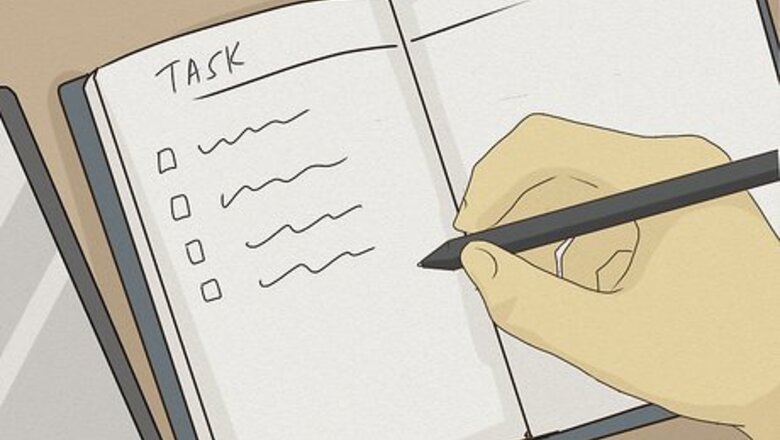
views
Making Tasks Easier
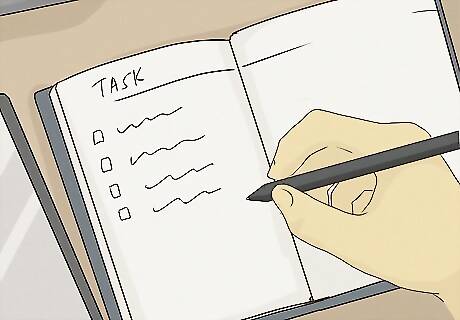
De-clutter your mind. When your mind is buzzing with all the different things you need to do in a day, it's harder to get things done. To help you focus, take the time to write or type out a physical list for the day. That way, you're not trying to keep them all in your head at once. Plus a list can help you see just how much you've done in a day, which can motivate you.
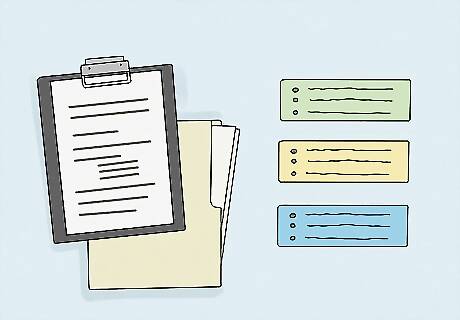
Break work into smaller chunks. When you're depressed, even small tasks can seem monumental; therefore, it's best to try to view tasks in smaller chunks, so that you can accomplish things piece by piece. Instead of thinking, "I need to send 500 emails today," think "I have one email to send in the next five minutes. I can do that." Making tasks smaller makes it seem easier to do them. If it doesn't seem to be working, try even smaller chunks. You could say, "I just need to get through this one sentence. That's it."

Skip the pressure to begin. Sometimes, trying to figure out how to begin a task is the hardest part. Maybe you can't find the words you need to start a report, for instance. The key is to just start somewhere. You don't have to start at the "beginning." You just need to get started. Once you have some work done, you'll find it easier to go back and work through the beginning. Also, you won't be paralyzed with indecision about how to "start."
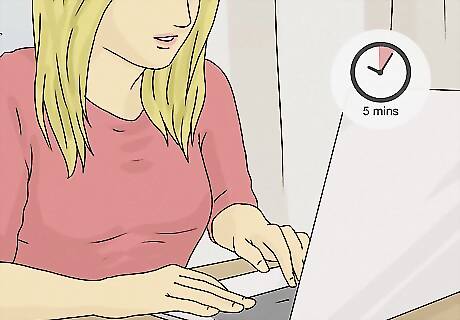
Make yourself work for five minutes straight. It can be tempting to give in to procrastination when you're feeling depressed. You have a tendency to get distracted, for instance, or you have a desire to get up and do something else; however, just promising yourself you'll work for a set amount of time can help get you started. Cut out distractions. Don't go anywhere else on the internet than what you need for work. Don't go talk to a friend. Just sit down and pay attention only to your work. Remind yourself you can't do anything else. Even if you don't work, don't allow yourself to do something more interesting. If you're in a more active job, try to cut distractions like talking to co-workers and just focus on the task at hand. Set a timer if you need to. Set it for five minutes, then give yourself a short break and start again.

Try a reward system. A reward system can be as simple as, "If I get this task done, I'll get a cup of coffee." You could also try, "If I get this task done, I'll go talk to my friend for five minutes." Only give yourself the reward if you actually get it done. Another reward could be a task you enjoy more. Maybe you hate sending emails but enjoy interviewing customers. Try the task you hate first, and reward yourself with the more enjoyable task. You can also set rewards for the day, such as, "If I get this list accomplished, I'll get Thai food tonight." Make sure you don't make your tasks unattainable. You should be able to accomplish them if you get down to work.

Take advantage of your better days. That is, when you're having an up day, try to be as productive as possible. That way, when you have down days, you can maybe take a little break. You'll still need to work obviously, but maybe you won't have to work quite as hard.

Just get there. Part of treating depression is trying to be more active. If your job is more active, obviously you won't feel like doing it. When you can, force yourself to go, as just being more active and being around people can help. When you can't cope at all, take a sick day if possible. Doing well at work can also help you feel better about yourself.

Work on saying "no." It can be hard to say "no" at work to new projects and commitments; however, if you're overextended, due in part to your depression, you can calmly tell your boss that, or speak to someone in human resources. Some bosses will not understand, of course, but it's worth a shot for your mental health. Plus, some bosses may not even realize they're giving you too much to do, even when you are feeling better mentally.
Managing Apathy and Lethargy

Identify feelings of apathy and lethargy. Apathy and lethargy are commonly experienced by people who are depressed and they can make it extremely difficult to feel motivated to do things, from seeking help to going to work to simply getting out of bed in the morning. Apathy is an actual lack of emotion — it means you feel nothing. It has been shown that you must have a feeling about something in order to be motivated to change it, so feeling apathetic makes it extremely difficult to change your situation. You might know that your lack of productivity at work might get you in trouble or even fired, but you simply can't make yourself care enough to actually do anything about it. Lethargy is a feeling of fatigue, which can make it even harder to work up the motivation to do things, even when you know you must. Apathy may cause you to feel like happiness, fulfillment, or the ability to reach your goals are impossible. You may feel bored, worn out, and like there is nothing to look forward to. If you notice feelings of apathy or lethargy as part of your depression, you will need to learn to manage and overcome them to be productive at work.

Change your mindset. The challenge with apathy and lethargy is that you don't feel like doing anything. So, while there may be many things you can do to relieve those feelings, you can't get yourself motivated to actually do them. Overcoming these feelings begins with changing your mindset so you get to a place where you can begin to take action. Start challenging your apathy. Recall the times in the past when you felt happy, motivated, and enthusiastic. What were you doing? Who were you with? Try to do something as small as text someone who always makes you laugh, or do a crossword puzzle if that's something you used to enjoy. Start small. Ask yourself what you can do right now to move forward, even a tiny bit. Maybe you know you should see a doctor, but your lethargy and apathy are making it seem impossible. Try simply doing an online search of doctors in your area. You don't need to call or make an appointment today — just take that first, small step. Identify the things you cannot change. Perhaps you feel apathetic because there are some things about your situation you simply cannot change right now. Work on accepting those things and focusing on what you can change. Manage your expectations. Setting your expectations too high and asking too much of yourself sets you up for failure and can make you feel worse about yourself. It's okay to adjust your expectations throughout the day — even multiple times. If you start to feel overwhelmed, check in with yourself and consider that your current expectations may be too high.

Address lethargy by eating well. Depression may cause you to lose your appetite or turn to unhealthy comfort foods, which can drain your energy and leave you tired and fatigued. Try setting an alarm to go off ever two to three hours and make yourself eat a healthy snack containing protein and complex carbs. These foods can give you energy. Try eggs, yogurt, meat, raw greens, and nuts. Avoid sugar, which can give you a quick burst of energy but ultimately cause you to crash. It may also cause you to feel irritable.

Be kind to yourself. Getting down on yourself for your feelings of depression, apathy, and/or lethargy will only make you feel worse and isn't constructive in any way. Putting yourself down and calling yourself "lazy" won't do anything to motivate you to do more work. Take steps to end negative self-talk by first becoming aware that you are doing it. Ask yourself — What am I saying to myself? What messages am I sending? Would I say this to a friend? Try apologizing to yourself when you catch yourself engaging in negative self-talk. Say something like, "I didn't deserve that. I'm not lazy — I'm depressed, and there is a difference. I am doing the best I can right now."

Check in with your doctor. If you're continuing to feel apathetic and lethargic, you should talk to your doctor. There's no shame in getting medical help to improve your mental health. If your depression is affecting your work, it may be time to think about an antidepressant. If you are already taking an antidepressant, you may need to have your medication adjusted, either by upping the dose of your current medication or switching to a different one.”
Encouraging Good Mental Health at Work
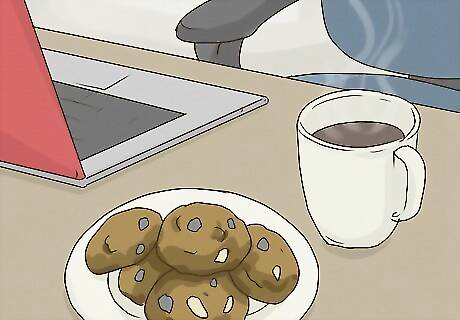
Make time for breaks. It may make you feel more productive to push through to the end of a task, but getting some space from it can actually help. Taking a break can assist with mental clarity, as well as boost your mood and memory. Try to take breaks regularly throughout the day, and you'll likely notice an increase in your productivity.

Try a deep breathing technique. Another way to calm yourself is to use deep breathing techniques. Deep breathing just means taking a moment for yourself to relax and focus on your breathing, sort of a mini-meditation. All you need to do is close your eyes (if you can) and focus on your breathing. Try breathing in for four counts, holding for four counts, breathing out for four counts, and holding for four counts. Repeat a couple of times until you feel yourself calming down.

Increase the light. Make sure you're getting enough natural sunlight during the day. Being stuck inside, especially during the winter months, can mean you're not getting enough sunlight. Sunlight helps your body produce vitamin D, which can boost your mood. Try to spend a few minutes outside on your breaks. You can also open your blinds or go stand by a window on your breaks.

Work some exercise in. Exercise is a natural mood booster — in fact, it may be as effective in treating depression as some antidepressants — so if you can work some exercise into your day, you can help increase your productivity. Try adding some small exercise routines that you can do around your workspace or during your breaks. For instance, take a short walk around the office or outside the building on your lunch break. Try doing a few jumping jacks when there are no customers around. When you feel yourself getting tired, try standing up and jogging in place for a few minutes. If you already have an active job that makes you move around, that's all the better.

Vent if you can. If you are experiencing anxiety in addition to depression, it may help to find someone you can vent to. Of course, it must be someone you trust implicitly, so you know they won't go behind your back and use the information against you. Nonetheless, having someone to talk to at work can help keep your stress levels down. If you don't trust someone enough at work, find a friend outside of work. It won't be quite the same (since they don't know who's involved), but they can still listen.
Creating a Calming Space
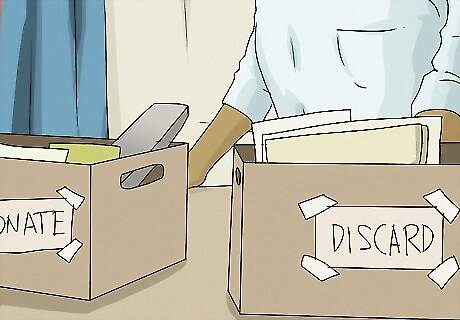
De-clutter your workspace. Clutter is a nuisance because it makes it harder for you to work. In addition, it can also contribute to your depression. On your good days, try to keep your work area uncluttered so that on your bad days, having too much stuff around won't bring you down even further.

Listen to calming music. If you're depressed, you may also be feeling some anxiety about not being able to get your work done. That anxiety isn't going to help the situation. Try keeping yourself calm by listening to some music that soothes you, if your boss allows it. Of course, put in some headphones so you don't disturb your neighbors, particularly if you are in a cubicle or out in the open.
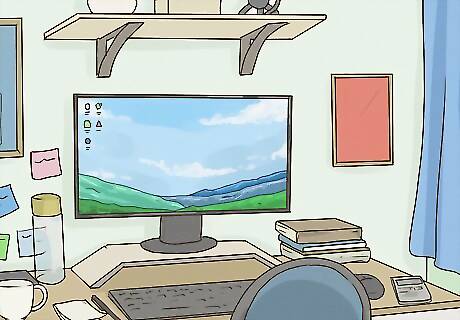
Try adding some blue. Blue can be a calming color, keeping you relaxed. It can also help increase your productivity. Try adding some splashes of blue to your desk or work space or changing your computer background to a predominantly blue picture. If you can't change much, try adding a touch of color, such as a tiny stuffed animal or sticker where customers can't see it.
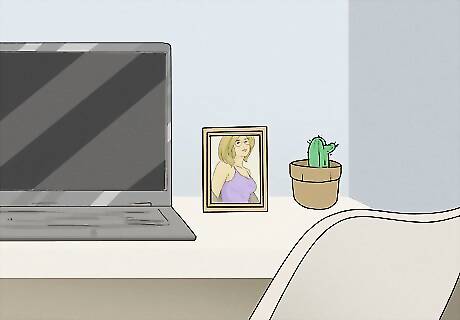
Add visuals that make you happy. If you can, add some pictures or art to your workspace that make you feel happier. Put up pictures of your kids if that's your thing, or have a desk calendar with cat pictures. You could also put up prints of artwork you enjoy.

















Comments
0 comment